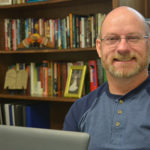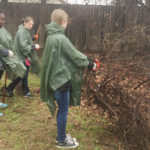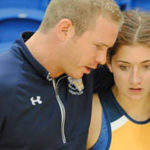PLAINVIEW—Haley Hill always wanted to be a teacher and coach, and her summer in Japan did not change that calling. But it did solidify in her mind that she is called to be “on mission” even in her chosen career by intentionally living out her faith.
|
Wayland Baptist University student Haley Hill (second from left) joins her fellow missionaries and several Japanese friends from the university at a restaurant for fellowship time, a large part of her summer work in the Asian nation.
|
Hill is a junior middle blocker and outside hitter for Wayland Baptist University’s Pioneer volleyball team, having transferred in spring 2009 from New Mexico Military Institute. A native of San Angelo, Hill said her trip to Japan definitely was orchestrated by God, encouraged by a few youth who issued a challenge.
“During the summer of 2008, I was working a Super Summer, and they announced a meeting about the trip to Japan, but I didn’t know if I was supposed to go,” she recalled. “Some of my camp kids challenged me and said, ‘You told us not to stay until you’re called to go but to go until you’re called to stay.’”
Hill agreed to pursue the opportunity, having visited Germany in 2007 with iWitness ministries, the same organizing group for the Japan trip. She quickly decided to apply and see what happened. While the organization requires an in-person interview for the trips, Hill was unable to attend since she was in a military school.
“I told God if he wanted me to be there, he’d make it happen. We did the interview on the phone, and I found out in November I was accepted,” she said. “It was definitely a God thing.”
Soon thereafter, Hill transferred to Wayland to play volleyball and began raising the money for her trip that spring. She noted that her coach, Jim Giacomazzi, was understanding of her desire to make another overseas trip and flexible about her return time if it interfered with pre-season workouts.

Haley Hill, a junior at Wayland Baptist University, holds up her flag after reaching the summit of Mount Fuji in Japan just a few hours before sunrise.
|
The mission work was part of the Free Greater Tokyo effort, specifically the Tokyo 5:9 project, based on Rev. 5:9, which states, “With your blood, you purchased men for God from every tribe and language and people and nation.”
Hill and the other summer missionaries had four primary activities during their time in Tokyo, mostly dealing with relational evangelism or direct efforts. Each day, the groups traveled from their apartments to train stations and offered five-minute English lessons outside the stations for two to three hours.
Sign up for our weekly edition and get all our headlines in your inbox on Thursdays
The Americans held signs reading “Five-minute English Lessons” in both English and Japanese—an attractive offering for Japanese business people who love the opportunity to hone their English-speaking skills.
“The lessons would mainly consist of us first telling them that we came to Japan to make friends and to share what we believe, then we’d ask them three questions—their favorite movie, their favorite music and their favorite book, to practice their conversational skills,” Hill said.
“That would lead us to mention our favorite book, the Bible, and we’d offer them a summary of the Bible. If they wanted to hear more, we would share more.”
That effort was the most successful of the summer since they were able to speak and share God’s love with the commuters, Hill noted.
Since they were in the same stations each day and week, commuters became familiar with seeing them, and the missionaries were able to build some relationships with people over time. Hill said they witnessed to about 100 people each week doing the five-minute lessons.
The group also did campus ministry on a nearby university campus, taking two days each week to prayerwalk the campus and seek out opportunities to speak to the students there. Once they began to build friendships, they invited students to join them for lunch and shared the purpose of their visit, opening up more about their faith.
“They were very open and friendly with us,” Hill noted. “It’s a big deal there to have American friends, so they wanted to be there with us.”
Afterward, they’d engage their peer students in other common activities such as karaoke or bowling or visiting the picture booths that are so popular in Japan. That deepening friendship gave them a chance to share their beliefs about God’s love and Christ’s death on the cross for their sins. Hill and another missionary even joined the basketball club at the campus in order to minister through a shared interest in sports.
Weekends provided opportunities to spend more time with friends, specifically in the city parks. Families often gather there for picnics, games, riding bikes, paddle boating in the lakes and other activities, Hill observed. The missionaries found it easy to find activities engage people, from soccer to face-painting for children. They also visited the many park vendors and built relationships with them, as well.
The missionaries also distributed tracts and gospel messages. On two days of the week, the group would hand out the Gospel of John in Japanese and a tract titled “Hope” in various locations. The tract offered a free New Testament and a DVD with the story of Christ for anyone interested.
The missionaries visited the same train stations and walked through the communities handing out their messages, also dropping them in mailboxes if residents weren’t home, prayerwalking as they went.
Over the course of the summer, Hill said the group handed out more than 500,000 Hope tracts and 100,000 Gospels of John. Short-term mission groups from various cities were part of that effort as they joined the team for evangelistic opportunities.
Evenings offered free time for the missionaries, although they were encouraged to hang out with their Japanese friends and contacts and continue building relationships that might lead to conversations of faith. That happened often, Hill said, and the group noticed increased curiosity from their friends. One girl, Diana, even invited some of the Americans to her home for dinner, an uncommon practice, Hill said, since many Japanese are very self-conscious around Americans regarding about their small homes.
Toward the end of the summer in Japan, Hill and her fellow interns enjoyed an outing to climb Mount Fuji. The group started at the base at 9:30 p.m. and reached the summit around 2:30 a.m., waiting on the mountain to enjoy the sunrise at 4:30 a.m.
While she did not walk away from her summer with plans to be a career missionary, Hill said she thinks she’d like to pursue the Journeyman program for her first few years after graduation.
She’s been invited back to Japan for summer 2010 to serve on the leadership team, and she is already excited about returning. She feels the coming summer will help her decide if Asia is her calling as a short-term missionary in the future.
“I went into the summer looking for what God wanted me to do. I’ve always felt that I’m supposed to serve him some way through the church but didn’t know how,” she said. “I definitely learned that it’s not a career thing for me, but I feel like as a coach and teacher, I can still be a missionary in my career. I feel like God’s given me an opportunity to reach the people that I’ll be working with.
Although that might be looking down the road a bit, Hill said, God shook her a little about her current lifestyle and that of her fellow missionaries.
“The summer was almost like a slap in the face for us, really. Why aren’t we telling people, especially our friends we see every day, about God? We don’t live boldly like we need to, so it was a huge thing for us,” she said.
“I was so excited to come back to Wayland and be able to make an impact on campus. I really want to do things here, and God has revealed to me the needs on our campus.”














We seek to connect God’s story and God’s people around the world. To learn more about God’s story, click here.
Send comments and feedback to Eric Black, our editor. For comments to be published, please specify “letter to the editor.” Maximum length for publication is 300 words.